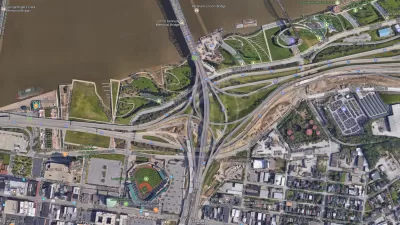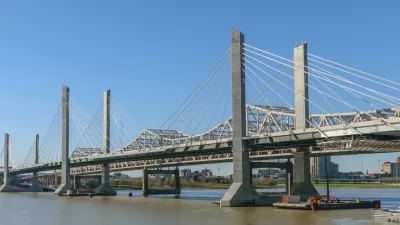A decade-long campaign to stop the $2.6 billion Ohio River Bridges project in Louisville has apparently lost out to intrenched interests. With the help of the campaign's founders, Angie Schmitt examines where the popular grassroots effort went wrong.
"At $2.6 billion, the Ohio River Bridges project in Louisville, Kentucky, is the costliest in the state’s history. It includes 18 elevated lanes, two enormously expensive bridges, a mammoth raised interchange, and a $225 million tunnel under an undeveloped suburban property (“Indiana’s Big Dig“)," writes Schmitt.
"For years, Louisville residents J.C. Stites and Tyler Allen fought for a more humane, down-to-earth solution." Stities and Allen built a large grassroots organization to back their proposal to replace the elevated portion of I-64 adjacent to downtown Louisville with a boulevard. Even Michael Kimmelman weighed in against the highway expansion in a column for The New York Times.
But with the recent approval of $753 million in bonding for the project, it appears their efforts have failed. "Allen and Stites say they underestimated how committed their opponents were to the bridge plan, and how many political allies they had," notes Schmitt.
“Pretty quickly it became clear that the mayor was adamantly against [their proposal] and that he had the local newspaper in his camp,” said Stites. “We weren’t successful in convincing them that this was a compromise they should support.”
FULL STORY: Grassroots Efforts “Crushed” by Louisville’s $2.6 Billion Bridge Boondoggle

Alabama: Trump Terminates Settlements for Black Communities Harmed By Raw Sewage
Trump deemed the landmark civil rights agreement “illegal DEI and environmental justice policy.”

Planetizen Federal Action Tracker
A weekly monitor of how Trump’s orders and actions are impacting planners and planning in America.

The 120 Year Old Tiny Home Villages That Sheltered San Francisco’s Earthquake Refugees
More than a century ago, San Francisco mobilized to house thousands of residents displaced by the 1906 earthquake. Could their strategy offer a model for the present?

In Both Crashes and Crime, Public Transportation is Far Safer than Driving
Contrary to popular assumptions, public transportation has far lower crash and crime rates than automobile travel. For safer communities, improve and encourage transit travel.

Report: Zoning Reforms Should Complement Nashville’s Ambitious Transit Plan
Without reform, restrictive zoning codes will limit the impact of the city’s planned transit expansion and could exclude some of the residents who depend on transit the most.

Judge Orders Release of Frozen IRA, IIJA Funding
The decision is a victory for environmental groups who charged that freezing funds for critical infrastructure and disaster response programs caused “real and irreparable harm” to communities.
Urban Design for Planners 1: Software Tools
This six-course series explores essential urban design concepts using open source software and equips planners with the tools they need to participate fully in the urban design process.
Planning for Universal Design
Learn the tools for implementing Universal Design in planning regulations.
Clanton & Associates, Inc.
Jessamine County Fiscal Court
Institute for Housing and Urban Development Studies (IHS)
City of Grandview
Harvard GSD Executive Education
Toledo-Lucas County Plan Commissions
Salt Lake City
NYU Wagner Graduate School of Public Service




























